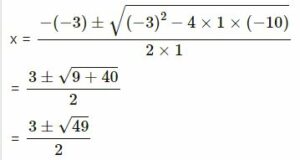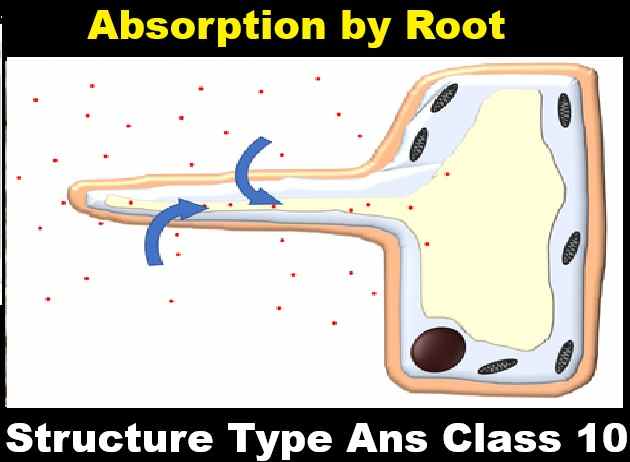ML Aggarwal Quadratic Equations MCQs Class 10 ICSE Maths Solutions Ch-5. We Provide Step by Step Answer of MCQs Questions for Quadratic Equations in One Variable as council prescribe guideline for upcoming board exam. Visit official Website CISCE for detail information about ICSE Board Class-10.
ML Aggarwal Ch-5 Quadratic Equations in one Variable MCQs Class 10 ICSE Maths Solutions
| Board | ICSE |
| Subject | Maths |
| Class | 9th |
| Chapter-5 | Quadratic Equations |
| Writer / Book | Understanding |
| Topics | Solutions of MCQs |
| Academic Session | 2024-2025 |
Ch-5 Quadratic Equations in one Variable MCQs
(Class 10 ICSE ML Aggarwal Maths Solutions)
Choose the correct answer from the given four options (1 to 10) :
Question -1 Which of the following is not a quadratic equation ?
(a) (x + 2)2 = 2(x + 3)
(b) x2 + 3x = ( – 1) (1 – 3x)
(c) (x + 2) (x – 1) = x2 – 2x – 3
(d) x3 – x2 + 2x + 1 = (x + 1)3
Answer -1
(a) (x + 2)2 = 2(x + 3)
⇒ x2 + 4x + 4 = 2x + 6
⇒ x2 + 4x – 2x + 4 – 6 = 0
⇒ x2 + 2x – 2
It is a quadratic equation.
(b) x2 + 3x = ( – 1) (1 – 3x)
⇒ x2 + 3x = –1 + 3x
⇒ x2 + 1 = 0
it is also quadratic equation.
(c)(x + 2) (x – 1) = x2 – 2x – 3
x2 – x + 2x – 2 = x2 – 2x – 3
x2 – x2 + x + 2x – 2 + 3 = 0
⇒ 3x + 1 = 0
It is not a quadratic equation.
(d) x3 – x2 + 2x + 1 = (x + 1)3
= x3 + 3x2 + 3x + 1
x3 – x2 + 2x + 1
3x2 + x2 – 2x – 1 + 3x + 1 = 0
⇒ 4x2 + x = 0
It is a quadratic equation
Question- 2 If 1/2 is a root of the quadratic equation 4x2 – 4kx + k + 5 = 0, then the value of k is
(a) – 6
(b) – 3
(c) 3
(d) 6
Answer-2
12 is a root of the equation
4x2 – 4kx + k + 5 = 0
Substituting the value of x = 1/2 in the equation

1 – 2k + k + 5 = 0
⇒ – k + 6 = 0
k = 6.
Question-3 The roots of the equation x2 – 3x – 10 = 0 are
(a) 2,- 5
(b) – 2, 5
(c) 2, 5
(d) – 2, – 5
Answer-3
x2 – 3x – 10 = 0

either
= (3+7)/ 2
∴ x = 10/2 = 5
or
x = (3-7)/2
=-4/2 = –2
x = 5, – 2 or – 2, 5 (b)
Question-4 If one root of a quadratic equation with rational coefficients is (3- √5) / 2, then the other
(a) (-3 – √5)/2
(b) (- 3+ √5)/2
(c) (3+ √5)/2
(d) ( √3+ 5)/2
Answer-4 One root of a quadratic equation is (3- √5)/2, then other root will be (3+ √5)/2, (c)
Question-5 If the equation 2x² – 5x + (k + 3) = 0 has equal roots then the value of k is
(a)9/8
(b)-9/8
(c)1/8
(d)-1/8
Answer-5
2x² – 5x + (k + 3) = 0
a = 2, b = –5, c = k + 3
∴ b2 – 4ac
= (–5)2 – 4 x 2 x (k + 3)
= 25 – 8(k + 3)
∴ Roots are equal.
∴ b2 – 4ac = 0
∴ 25 – 8(k + 3) = 0
25 – 8k – 24 = 0
1 – 8k = 0
⇒ 8k = 1
∴ k = 1/8.
Question-6 The value(s) of k for which the quadratic equation 2x² – kx + k = 0 has equal roots is (are)
(a) 0 only
(b) 4
(c) 8 only
(d) 0, 8
Answer-6
2x² – kx + k = 0
a = 2, b = -k, c = k
∴ b2 – 4ac
= (-k)2 – 4 x 2 x 4
= k2 – 8k
∴ Roots are equal.
∴ b2 – 4ac = 0
k2 – 8k = 0
⇒ k(k – 8) = 0
Either k = 0
or k – 8 = 0,
then k = 8
k = 0, 8.
So option (d) is correct
Question-7 If the equation 3x² – kx + 2k =0 roots, then the the value(s) of k is (are)
(a) 6
(b) 0 Only
(c) 24 only
(d) 0
Answer -7
3x² – kx + 2k = 0
Here, a = 3, b = -k, c = 2k
b2 – 4ac
= (–k)2 – 4 x 3 x 2k
= k2 – 24k
∴ Roots are equal.
∴ b2 – 4ac = 0
∴ k2 – 24k = 0
⇒ k(k – 24) = 0
Either k = 0
or
k – 24 = 0,
then k = 24
∴ k = 0, 24.
Question -8 If the equation {k + 1)x² – 2(k – 1)x + 1 = 0 has equal roots, then the values of k are
(a) 1, 3
(b) 0, 3
(c) 0, 1
(d) 0, 1
Answer -8
(k + 1)x² – 2(k – 1)x + 1 = 0
Here, a = k + 1, b = -2(k – 1), c = 1
∴ b2 – 4ac
= [–2(k –- 1)]2 – 4(k + 1)(1)
= 4(k2 – 2k + 1) – 4k – 4
= 4k2 – 8k + 4 – 4k – 4
= 4k2 – 12k
∵ Roots are equal.
∴ b2 – 4ac = 0
∴ 4k2 – 12k = 0
4k(k – 3) = 0
⇒ 4k(k – 3) = 0
⇒ k(k – 3) = 0
Either k = 0
or
k – 3 = 0,
then k = 3
k = 0, 3
Option (b) is correct
Question-9 If the equation 2x² – 6x + p = 0 has real and different roots, then the values of p are given by
(a)p < 9/2
(b)p ≤ 9/2
(c)p > 9/2
(d)p ≥ 9/2
Answer-9
2x² – 6x + p = 0
Here, a = 2, b = -6, c = p
b2 – 4ac
= (–6)2 – 4 x 2 x p
= 36 – 8p
∵ Roots are real and unequal.
∴ b2 – 4ac > 0
⇒ 36 – 8p > 0
⇒ 36 > 8p
⇒ 36/8 > p
⇒ p < 36/8
⇒ p < 9/2.
Question-10 The quadratic equation 2x² – √5x + 1 = 0 has
(a) two distinct real roots
(b) two equal real roots
(c) no real roots
(d) more than two real roots
Answer -10
2x² – √5x + 1 = 0
Here, a = 2, b = -√5, c = 1
b2 – 4ac
= (-√5)² -4×2 x1
= 5 – 8
= -3
∵ b2 – 4ac < 0
∴ It has no real roots.
So option (c) is correct
— : End of ML Aggarwal Quadratic Equations MCQs Class 10 ICSE Maths Solutions : –
Return to :- ML Aggarwal Solutions for ICSE Class-10
Thanks
Please Share with Your Friends


